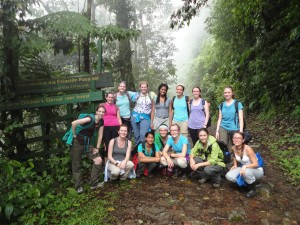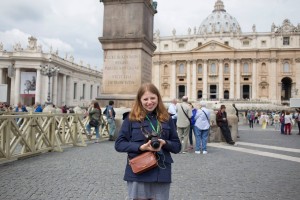By Emily Schmidt, BA Visual Arts, 2015
The opportunity to study abroad twice during your college career is definitely not typical, and I knew I needed to carefully think about my decisions of where to go. It seemed counterproductive to go to the same city for the same experience, and I even considered choosing a different country, in some weird effort to soak up as much worldly knowledge and culture as possible. However, upon further thought I decided to go “an inch wide and a mile deep” rather than “a mile wide and an inch deep”. In other words, I’ve chosen to focus on Italian culture and language with the hope of becoming an expert and effectively making Italy my home away from home. To do this, I needed to stay away from the ultra-touristic cities such as Rome and Florence the second time around to round out my understanding of Italy.
My time living in Florence was the typical study abroad experience. For one summer month, I lived with a host family, took a couple classes each week, and saw almost every site and city of historical or cultural importance that Italy had to offer, including Rome, Venice, Milan, Verona, and Pisa. We hit 6 cities (2 per day) every weekend, and the month went by in a flash. Coming to Italy the second time, I felt that I had the cliché “must do” experience out of the way, allowing me to focus my energy on the people rather than the places. While in Viterbo, I’ve realized that the reason I love Italy so much is due less to the art and history (as incredible as it is) and more because of the people and culture. I’ve become accustomed to the easy-going lifestyle here, and no doubt I will begin to miss it as soon as I step on the plane home.
I’ve only recently realized just how much I love the people of Italy and I attribute that to my unique perspective of having studied here before and getting the “important” things out of the way. I am less worried about having to see all the famous sites and am now able to sit back, observe, and find my place among the people living in Viterbo. Studying abroad twice has also given me a unique perspective in watching my American friends discover Italy for the first time. I had a bit of an outsider’s perspective for the first two weeks as everybody around me oohed and awed at things that a short month in Florence had already hardened me for. I also realized I had once been in those shoes, and it was fun noting the things that made them gasp and laugh that I had forgotten about. I feel that in this way I’ve gained an interesting perspective on the experience of studying abroad, not just on the country itself.
I’ve learned a lot while abroad. Any tourist or student will find that learning Italian in a city like Rome, where everybody speaks English, is not much different than learning Italian in Pittsburgh where you speak the language for a couple hours per week and quit as soon as you leave the classroom. Living in a small town like Viterbo forces you to use what you know. I’ve also learned so much about Italian culture in general. I’ve seen the faster pace of the big city where everyone is doing something and going somewhere, and I’ve now seen the slower pace of a small town where tractors cruise down the main streets and people seem to have nothing to do but live la dolce vita. I’ve rounded out my understanding of culture and people in a way that would not have been possible in a singular experience.
Studying abroad has made me appreciate home in many ways. For one, I’ve realized how stable our economy is compared to Italy’s. Every Viterbo native I’ve talked with has spoken of the impossibility of finding work in Italy, allowing me to appreciate my silly summer job at McDonalds. Also, after my first trip abroad, I found myself in awe of the beauty of my own home. Italy is unquestionably a beautiful country and upon seeing it for the first time, it can leave you in shock. However, upon returning home, I realized the beauty of my own country, which I had previously taken for granted having lived there my entire life. I could compare the rolling hills of Italy to home, and even the Pittsburgh skyline had a new sheen I’d not previously realized.
The biggest advantage to studying in two different cities is being able to compare and contrast your experiences which allows you to constructively evaluate your time abroad. It is important to break it down and define your experiences to yourself, as this allows you to get more out of your time abroad. Living in two different cities in the same country will allow you to round out your understanding of a people and a culture, something I value greatly.



